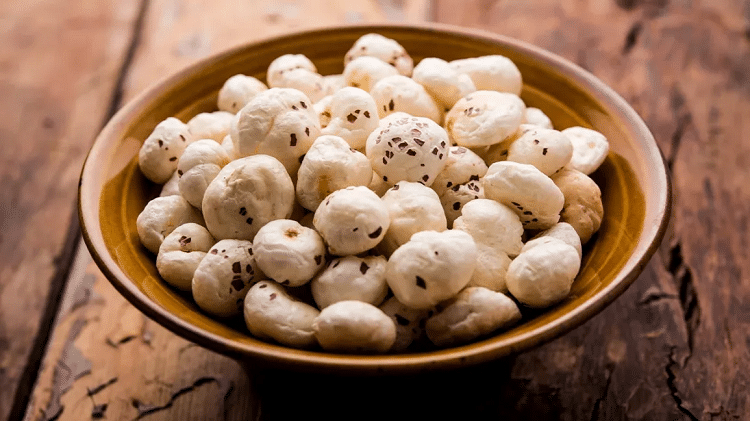Makhana Health Benefits: A Complete Guide to the Superfood

Makhana, also known as fox nuts or lotus seeds, is a highly nutritious and versatile snack that has been a part of traditional diets in India for centuries. Over recent years, makhana tgtube has gained global recognition as a superfood due to its wide range of health benefits. It is low in calories, rich in essential nutrients, and can be enjoyed by people of all ages. In this article, we’ll explore the many makhana health benefits, discuss how it can be incorporated into your diet, and answer frequently asked questions to help you make the most of this powerhouse snack.
What is Makhana?
Makhana is harvested from the seeds of the Euryale Fox plant, which grows in water. These seeds are then popped, much like popcorn, to create the crunchy and light snack we know as fox nuts. Makhana is a staple in Ayurvedic medicine, where it is used to balance the body’s doshas and treat a variety of ailments. In addition to being used in traditional dishes, it has now gained popularity as a healthy, convenient snack for people looking for better alternatives to processed junk food.
Nutritional Value of Makhana
Makhana is packed with essential nutrients that are beneficial for overall health. Here’s a breakdown of its nutritional value:
| Nutrient | Amount (per 100g) |
|---|---|
| Calories | 347 kcal |
| Protein | 9.7 g |
| Carbohydrates | 76.9 g |
| Fats | 0.1 g |
| Fiber | 7.6 g |
| Calcium | 60 mg |
| Iron | 1.4 mg |
| Magnesium | 52 mg |
| Potassium | 500 mg |
| Phosphorus | 90 mg |
This nutrient-dense profile makes makhana a great choice for those looking to improve their diet while enjoying a tasty and satisfying snack.
Top Makhana Health Benefits
Aids in Weight Loss
Makhana is low in calories and fat, making it a perfect snack for people aiming to lose or manage their weight. The high fiber content promotes satiety, helping you feel fuller for longer, thus preventing overeating or unhealthy snacking.
Why It Works: Makhana’s fiber-rich nature not only aids digestion but also curbs appetite, keeping you from consuming excess calories.
Improves Heart Health
Makhana is rich in potassium and low in sodium, which helps in regulating blood pressure levels. The presence of magnesium in makhana further promotes heart health by improving blood circulation and reducing the risk of cardiovascular diseases.
Why It Works: By balancing electrolytes and lowering cholesterol, makhana helps to maintain a healthy heart, especially for those with hypertension.
Rich in Antioxidants
Makhana contains powerful antioxidants like flavonoids, which play a crucial role in fighting free radicals. This helps in preventing cellular damage and reduces the risk of chronic diseases such as cancer and diabetes.
Why It Works: Antioxidants in makhana enhance overall immunity and slow down the aging process, keeping you healthier and more youthful.
Supports Kidney Health
Makhana has astringent properties that make it beneficial for maintaining healthy kidneys. It aids in detoxifying the system and helps in reducing urinary disorders.
Why It Works: The natural properties of makhana promote the filtering function of the kidneys, making it a great food for maintaining kidney health.
Regulates Blood Sugar Levels
Makhana has a low glycemic index (GI), which means it causes a slower rise in blood sugar levels. This makes it an ideal snack for people with diabetes or those looking to manage their blood sugar.
Why It Works: Makhana’s slow digestion process helps prevent sharp spikes in blood glucose, keeping energy levels stable and reducing cravings.
Strengthens Bones
Makhana is a good source of calcium, which is essential for maintaining strong bones and teeth. It can help prevent conditions like osteoporosis, particularly in older adults.
Why It Works: The high calcium content in makhana makes it an excellent food for those looking to improve bone density and strength.
Enhances Skin Health
Thanks to its antioxidant properties, makhana helps to prevent premature aging of the skin. Regular consumption of makhana can lead to better skin texture and reduced signs of wrinkles and pigmentation.
Why It Works: The antioxidants in makhana help in collagen production, which is crucial for keeping the skin youthful and glowing.
How to Include Makhana in Your Diet
Makhana is incredibly versatile and can be included in your diet in several ways. Here are a few ideas on how to enjoy makhana:
- Roasted Makhana: Roast makhana in a little ghee or olive oil with a pinch of salt and spices. This makes for a crunchy, savory snack.
- Makhana Kheer: Cook makhana in milk with cardamom and a bit of sugar or honey to create a healthy dessert.
- Makhana Salad: Add roasted makhana to your salad for an extra crunch.
- Makhana Curry: You can use makhana as a base for a delicious curry, cooked with tomatoes, onions, and spices.
- Trail Mix: Combine roasted makhana with nuts and dried fruits for a nutritious snack on the go.
Best Time to Eat Makhana
Makhana can be consumed at any time of the day, but here are some optimal times to include it in your diet:
- Morning: Add it to your breakfast for a protein and fiber boost.
- Midday Snack: Enjoy roasted makhana in between meals to curb hunger and boost energy.
- Evening Snack: A bowl of roasted makhana is a healthy alternative to fried snacks.
- Post-Workout: Makhana is a great post-workout snack due to its protein and mineral content.
FAQ: Makhana Health Benefits
Q1: Can makhana help with weight loss?
A1: Yes, makhana is low in calories and high in fiber, making it a great snack for weight loss. It keeps you full for longer, helping to reduce overall calorie intake.
Q2: Is makhana good for people with diabetes?
A2: Absolutely. Makhana has a low glycemic index, which means it releases sugar into the bloodstream slowly, helping manage blood sugar levels effectively.
Q3: Can makhana improve heart health?
A3: Yes, makhana is rich in potassium and low in sodium, which helps regulate blood pressure and improves overall heart health.
Q4: How much makhana should I eat per day?
A4: About 30-50 grams of makhana per day is enough to provide its health benefits. However, it’s important to consume it in moderation, especially if it’s roasted in ghee or oil.
Q5: Can makhana be eaten every day?
A5: Yes, makhana can be eaten daily as part of a balanced diet. Its nutrient profile makes it beneficial for regular consumption.
Q6: Is makhana good for bones?
A6: Yes, makhana is rich in calcium, which is essential for strong bones and teeth, making it particularly beneficial for older adults.
Makhana vs. Other Snacks: A Comparison
| Nutrient | Makhana (30g) | Popcorn (30g) | Potato Chips (30g) |
|---|---|---|---|
| Calories | 100 kcal | 150 kcal | 160 kcal |
| Fat | 0.1 g | 5 g | 10 g |
| Fiber | 3.0 g | 1.2 g | 1.0 g |
| Protein | 3.5 g | 3.0 g | 2.0 g |
| Carbs | 22 g | 30 g | 14 g |
Makhana stands out as a healthier snack option due to its lower calorie content, minimal fat, and high fiber levels, making it ideal for anyone looking to maintain a balanced diet.
Conclusion: Why Makhana Deserves a Place in Your Diet
Incorporating makhana into your diet is a simple and effective way to boost your overall health. From aiding weight loss to supporting heart health, makhana health benefits are numerous and well-documented. It’s a nutrient-dense, low-calorie snack that can easily replace less healthy alternatives in your diet. Whether roasted, in curries, or as part of a trail mix, makhana is versatile and delicious. Start adding makhana to your daily routine and enjoy its myriad health benefits.




